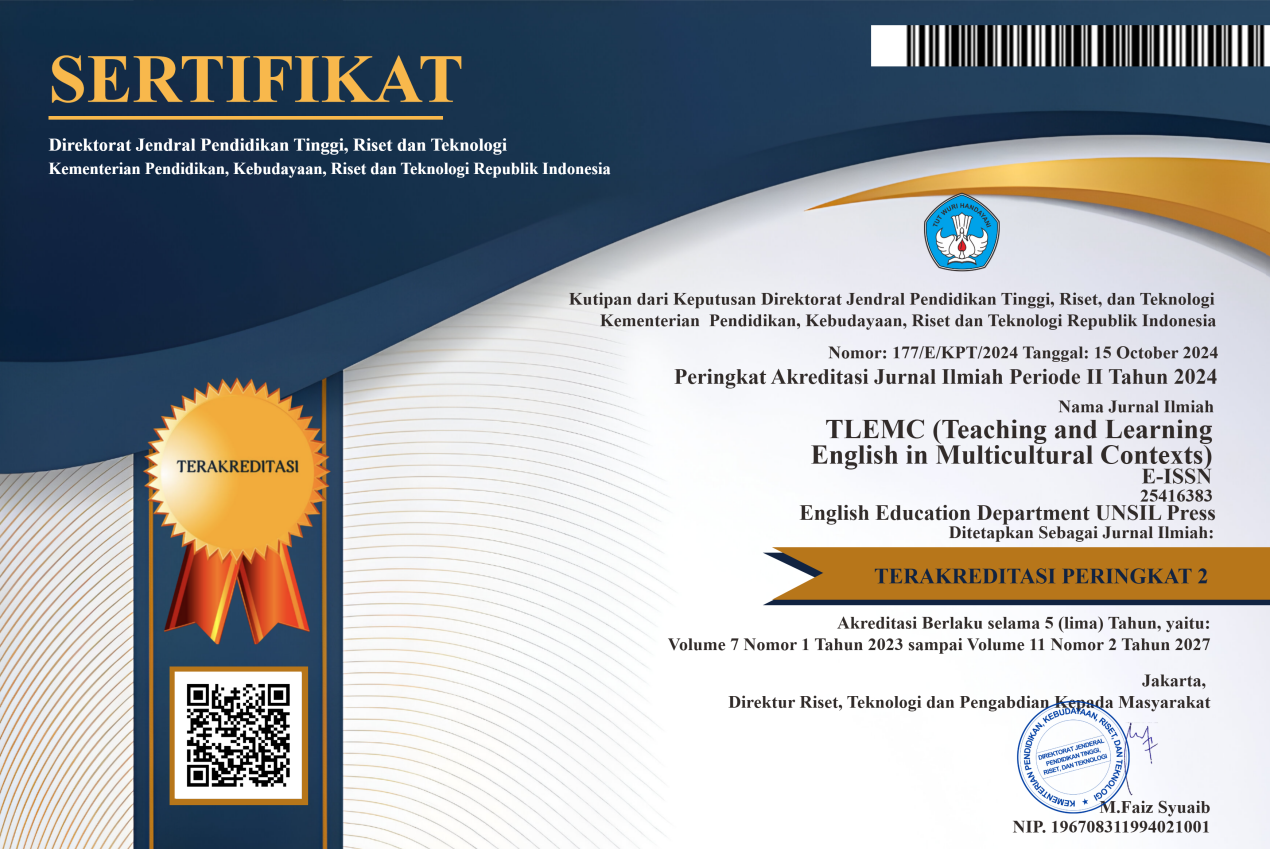Designing POCAB Using Powerpoint as a Medium for Teaching Adjectives to the 7th Grade Students
Abstract
This paper aims to describe the result of the project of creating the POCAB (PowerPoint Vocabulary) game as a medium for teaching English adjective vocabulary. The main objective of the research was to create vocabulary exercises to assist the students in learning descriptive adjective vocabulary. The research method was development research involving four phases of the ADDIE (Analyze, Design, Develop, Implement, and Evaluation). The hyperlink features and slide animation from the Microsoft PowerPoint application were combined to create an attractive game in this research. This product was implemented for eleven students of 7th-grade students at SMP Sentosa Pemangkat, West Kalimantan. The research findings show that the POCAB game is applicable as a medium to teach vocabulary materials related to descriptive adjective vocabulary. It is proven by the high percentage of recommendations from both the teacher and students. This means the product is categorized as "very good." From the research result, it can be concluded that the POCAB game is applicable as a medium to teach descriptive adjective vocabulary and is categorized as an excellent product.
Keywords: development research, POCAB game, media, descriptive adjective vocabulary
Â
Full Text:
PDFReferences
Aldoobie, N. (2015). ADDIE model. American International Journal of Contemporary Research, 5(6), 68-70. Retrieved from http://aijcrnet.com/journals/Vol_5_No_6_December_2015/10.pdf
Almunawaroh, N. F. (2022). What are the roles of educational electronic tools in reading motivation? Global Expert, 21-27. Retrieved from https://scholar.google.co.id/citations?view_op=view_citation&hl=en&user=CvRQB0kAAAAJ&citation_for_view=CvRQB0kAAAAJ:Se3iqnhoufwC
Branch, R. M. (2009). Intructional Design: The ADDIE Approach. New York: Springer.
De Leon Perez, M., & Dora Cecilia, G. (2013). The effectiveness of using power point for teaching vocabulary to increase the vocabulary knowledge for the reading skill. University of El Salvador, School of Arts and Sciences, San Salvador, El Salvador. Retrieved from https://ri.ues.edu.sv/5193/
Derakhshan, A., & Khatir, E. D. (2015). The effects of using games on english vocabulary learning. Journal of Applied Linguistics and Language Research, 2(3), 39-47. Retrieved from https://www.jallr.com/index.php/JALLR/article/viewFile/40/pdf_38
Gunawardhana, P. D., & Palaniappan, S. (2016). Using multimedia as an education tool. 9th Annual International Conference on Computer Games, Multimedia and Allied Technology (CGAT 2016), Kelana Jaya, PJ, Selangor, Malaysia. Retrieved from http://www.academia.edu/24684294/Using_Multimedia_as_an_Education_Tool
Hashemi, M., Azizinezhad, M., & Masoumeh, F. (2012). Power Point as an innovative tool for teaching and learning in modern classes. Procedia - Social and Behavioral Sciences, 31, 559-563. Retrieved from https://core.ac.uk/download/pdf/82409236.pdf
Marshall, D. (2001). The introduction of multimedia. Retrieved from http://www.academia.edu/3784843/Multimedia
Miles, M., & Huberman, A. M. (1994). Qualitative data analysis. Thousand Oaks, California: Sage Publication.
Nguyen, D. A. (2021). Using games to improve learning vocabulary for non-english-majored students at Bac Lieu University. Journal of Social Sciences Advancement, 2(1), 30-38. Retrieved from https://pdfs.semanticscholar.org/57bd/b94fd732133b68767372f33a0efd195ff2e9.pdf
Nugraha, I. S. (2015). Designing a story book as narrative reading materials based on west kalimantan folktales. Universitas Tanjungpura, English Education Study Program, Pontianak, West Kalimantan, Indonesia.
Permadi, K. S., Nitiasih, P. K., & Budasi, I. G. (2013). Developing supplementary english vocabulary games for the seventh grade students of SMP Negeri 2 Singaraja (Master's thesis). UNDIKSHA, English Education Study Program, Singaraja, Bali, Indonesia.
Pun, M. (2013). The use of multimedia technology in english language teaching: a global perspective. Crossing the Border: International Journal of Interdisciplinary Studies, 1(1), 29-38. Retrieved from https://www.researchgate.net/publication/272871799_The_Use_of_Multimedia_Technology_in_English_Language_Teaching_A_Global_Perspective
Rahmi, R. (2014). The used of multimedia in english language teaching. Getsempena English Education Journal, 1(2), 64-79.
Richey, R., & Klein, J. (2005). Developmental research methods: creating knowledge from instructional design and development practice. Journal of Computing in Higher Education, 16(2), 23-38. Retrieved from https://myweb.fsu.edu/jklein/articles/Richey_Klein_2005.pdf
Thornbury, S. (2002). How to teach vocabulary. Harlow, United Kingdom: Pearson Education Limited.
Wright, A., Betteridge, D., & Buckby, M. (2006). Games for language learning. Cambridge: Cambridge University Press.
Wulanjani, A. N. (2016). The use of vocabulary-games in improving children's vocabulary in english language learning. Transformatika, 12(1), 76-83. Retrieved from https://www.neliti.com/publications/197194/the-use-of-vocabulary-games-in-improving-childrens-vocabulary-in-english-language
Zaim, M. (2016). The power of multimedia to enhance learners' language skills in multilingual class. Proceeding of The Fourth International Seminar on English Language and Teaching (ISELT-4) (pp. 22-29). Padang: Indonesia.
DOI: https://doi.org/10.37058/tlemc.v6i2.4832
Refbacks
- There are currently no refbacks.
INDEXED BY:
This work is licensed under a Creative Commons Attribution-NonCommercial-ShareAlike 4.0 International License.
![]()
TLEMC (Teaching and Learning English in Multicultural Contexts)
Program Studi Pendidikan Bahasa Inggris
Fakultas Keguruan dan Ilmu Pendidikan
Universitas Siliwangi
Jl. Siliwangi No. 24 Kota Tasikmalaya - 46115
email: tlemc@unsil.ac.id





